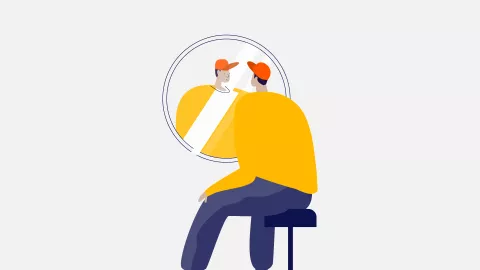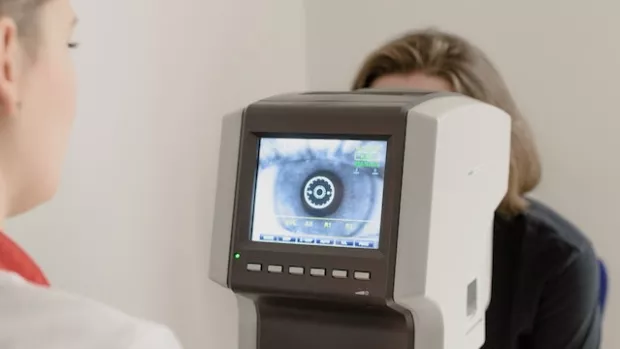
MS eye and vision problems
It’s very common for multiple sclerosis to cause eye problems, and many people with MS have problems with their vision at one time or another.
Read Emily's story about vision problems and her MS diagnosis in our community blog
The most common problems with vision in MS are:
- optic neuritis
- double vision (diplopia)
- involuntary eye movements (nystagmus)
Optic neuritis is often an early symptom of multiple sclerosis, although you might have problems with your eyes at any time. Some people experience eye movement problems like eyes twitching back and forth, double vision or wobbly vision.
Most people make a good recovery from their eye problem. And if it lasts longer there are places and people to turn to for support and practical help.
- Optic neuritis
- Double vision (diplopia)
- Nystagmus (involuntary eye movements)
- INO (Internuclear opthalmoplegia)
- What causes MS eye symptoms?
- Living with sight problems
Optic neuritis
About half of people with MS at some time or other get a particular problem called optic neuritis. This is when your optic nerve becomes inflamed.
Optic neuritis symptoms can include blurry vision, ‘washed out’ colour vision, and eye pain for a few days when you move your eyes.
Find out more about optic neuritis
Double vision (diplopia)
MS can also have an effect on parts of your brain that control how your eyes move. This can cause symptoms of double vision or wobbly vision.
Around 1 in every 3 people with MS at some point find their eyes don’t move as they should.
These effects can be so small that your vision isn’t affected. But your neurologist might see tiny changes in your eye movements.
You might hear your neurologist or ophthalmologist talk about ‘internuclear ophthalmoplegia (INO)’. INO can be the cause of diplopia and nystagmus.
If your eyes don’t work perfectly together you might see double - you see two of something when there’s only one. Things may be side by side, or one on top of another. Sometimes one of them may seem tilted to one side. Some people describe it as a ‘halo effect’.
This double vision might only happen when you look in certain directions. It could be when you look down, all the way to one side, or straight ahead. Double vision gives a confusing message to your brain. Some people get nausea (feeling sick) or vertigo (a spinning sensation).
In combination with other issues, it could affect your balance.
Read more about how vision can affect balance
Treating double vision
If you get double vision as part of a relapse, it often gets better on its own. A course of steroids, either as a drip (into the hand or arm) or a tablet (or both), can speed this up.
If you wear glasses, you can get a special kind of lens called a ‘prism’ fitted on to them for a while. A prism is plastic and makes sure that what both eyes are seeing is lined up properly. This stops you seeing double while your eyes get back to normal.
If you don’t normally wear glasses, you can have the prism fitted to a pair of glasses that have clear (non-prescription) lenses in them.
If double vision is affecting you a lot, you might be given an eye patch over one eye. This will block out the second image, but it’ll make it harder to see in 3D and judge distances.
Nystagmus (involuntary eye movements)
Nystagmus is a to-and-fro movement of your eyes that you can’t control and that won’t stop (involuntary eye movements). They can move from side to side, around, or up and down.
A doctor might notice nystagmus when testing your eyes. Many people don’t realise they have nystagmus because the movement may have little or no effect on their vision.
Some people notice objects seem to move back and forth, to jerk or to wiggle. This is called 'oscillopsia'. It can trigger vertigo - the feeling that everything is spinning around you. And this can affect your balance and make you feel sick.
Nystagmus can sometimes happen only when you look straight ahead, or only when looking in a particular direction.
And some people notice it gets worse when they’re stressed, tired or hot.
Treating nystagmus
Two drugs are recommended by NICE which may help reduce the jerky movements of nystagmus and make your vision better: gabapentin and memantine. NICE is the organisation that recommends which treatments should be available on the NHS in England.
Gabapentin and memantine don’t work for everyone. Other drugs have been trialed and may work for some people. Your doctor can discuss these with you. Research is also looking for new treatments.
Other things that might help:
- Advice on changing your day-to-day activities, so you avoid the worst of the ‘jumpy’ vision. That could be things like where you put your television, or the position you read in
- Prism lenses can keep your eyes in an area of steady vision
- Surgery on your eye muscles or Botox injections can dampen down the random eye movements
- If you have nystagmus only in one eye, a special contact lens can cloud out the jumpy images
Find more information and support for living with nystagmus from the Nystagmus Network
Internuclear ophthalmoplegia (INO)
Double vision and nystagmus can be symptoms of internuclear ophthalmoplegia (INO).
INO is quite common in MS. When there is a lesion on a specific part of the brain, it prevents the eyes from working together. For example, if you look to the right, your left eye may stay looking ahead.
It often gets better on its own. Some of the treatments mentioned above might help, such as prisms and eye patches.
The causes of MS eye symptoms
MS eye symptoms can be caused by:
- the effect of MS on your brain
- the effect of MS on your optic nerve
- the possible side effects of some treatments
Read more about what causes MS eye symptoms [link to new child page]
Living with sight problems
Changes to vision – whether they’re temporary or longer lasting – can have a major impact on daily life.
You might find it’s harder to do the things you normally do. Or you may have to ask someone else to help you.
However your sight is affected, there are usually things you can do to make your normal activities easier. And there are some things you might need to do, like let DVLA know if you’re a driver.
Managing MS sight problems
Driving and MS symptoms
If you drive, as soon as you’re diagnosed with MS, you must tell the Driver and Vehicle Licensing Agency (DVLA). In Northern Ireland tell the Driver and Vehicle Agency (DVA). They’ll contact your GP or neurologist to decide if you’re fit to drive.
If you’re diagnosed with MS you have to tell them about the diagnosis. And if you have problems with both eyes you need to let them know about that. But if only one eye is affected, you don’t need to tell them about that symptom.
You must tell your insurance company about your condition too.
Read more about eyesight and driving on the UK Government website
Identifying triggers
Some things can make your sight worse for a while. MS fatigue is one. Getting hot is another. You might be able to plan around this and avoid triggers when it matters most.
For example, if your fatigue affects your sight, you might avoid driving when fatigue’s likely to be worse. Or you might give yourself extra time for breaks during the journey.
Managing more lasting sight problems
Most people with MS don’t have lasting sight problems, but some people do.
If your sight can’t be put right with glasses or contact lenses, you can be referred to a low vision service or clinic.
These are normally in a hospital’s eye department. They help you make the most of your eyesight. You’ll have an assessment and they can lend you equipment – all free of charge.
Rehabilitation workers work with you to solve practical problems, like getting about safely. They teach skills to help with everyday life, like cooking. They can suggest useful equipment. They might give advice on using different techniques, such as specific eye movements.
You can find your local low vision service by:
- asking your doctor (GP)
- contacting a local hospital eye department
- asking your council’s social services department, or in Northern your Health and Social Care Trust
- using the RNIB's listing of low vision services and local groups
Coping with the impact of sight problems
Vision problems, such as suddenly losing some of your sight, can be a shock. It can mean a very worrying time, waiting to see if and when your sight will go back to normal.
It can have a major impact on how you’re feeling, and how you go about your daily life.
People often find it helpful to talk about how they feel about vision problems.
You can get in touch with our MS Helpline. They offer emotional support and have lots of information about eye problems and what help is out there.
And the RNIB has a telephone service with information and support, including counselling. This service isn’t only for people who are blind.
Last full review: | Next review:
We also update when we know about important changes.




